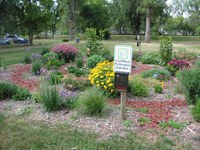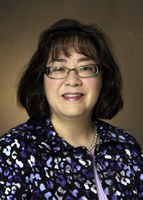Dakota Gardener: The Extension Master Gardener Program celebrates 50 years
(Click an image below to view a high-resolution image that can be downloaded)
By Esther E. McGinnis, horticulturist
NDSU Extension
In 2016, a roomful of Extension Master Gardener coordinators from around the country sat with bated breath as the speaker took the stage.
Dr. David Gibby, a distinguished silver-haired gentleman, began to speak of his childhood in the Southwest during the 1930s. He shared a story about his parents that defined his upbringing and inspired a community volunteer program that would be adopted in 49 states.
Gibby’s parents were traveling to an event and were dressed in their Sunday best. Before they could reach their destination, they were stranded by a flat tire in a remote location. A car full of teenagers stopped to help. While feeling apprehensive of strangers, the Gibbys accepted the offer.
The teens removed the damaged tire and said they needed to take the tire home to repair. An hour passed and the Gibbys assumed they had seen the last of the tire. Suddenly the teens reappeared and installed the repaired tire. Before the Gibbys could offer payment or thanks, the teens left. The Gibbys celebrated this act of kindness and encouraged their children to pay it forward.
Fast forward to the 1970s--David Gibby and his colleague Bill Scheer were overworked Extension agents in Washington state. Inundated with home gardening questions from rapidly urbanizing areas, the two community-minded agents could not keep up with the burgeoning demand for information. After deliberating, Gibby and Scheer came up with the concept for the Extension Master Gardener Program.
They would recruit and train volunteers to answer gardening questions and serve the needs of their communities. Based on their time spent in Europe, they were familiar with the German tradition of bestowing titles on individuals that demonstrated proficiency in certain trades. They settled on Gartenmeister which is translated as Master Gardener.
After some initial obstacles from skeptical administrators, Gibby and Scheer recruited volunteers. Two hundred applicants were accepted into the program.
Washington State University developed a 40-hour course to train the new applicants that included sessions on ornamental plants, fruits, lawns, vegetables, plant diseases, insects, weeds and pesticides. At the end of training, the applicants took a final exam to demonstrate topic proficiency. Upon completion of the course, Master Gardeners were expected to volunteer with the gardening public under the supervision of Extension.
The volunteer program was a success and has inspired programs in land-grant universities in 49 states and in Canada and South Korea. The Extension Master Gardener Program is celebrating its 50th anniversary in 2023.
The program has grown to over 86,000 volunteers in 49 states. In 2018, Master Gardeners volunteered over 5.6 million hours to benefit their communities and educated more than 8.6 million individuals. The pay it forward ethic of David Gibby is alive and well!
The North Dakota State University Extension Master Gardener Program was started in 1980 and currently has over 200 volunteers. In 2022, this generous group volunteered more than 12,500 hours in 37 North Dakota counties. Volunteers grew produce for food pantries, gave science-based gardening recommendations to the public and engaged in community beautification.
For more information on the Extension Master Gardener Program, visit https://www.ndsu.edu/agriculture/extension/programs/master-gardener.
NDSU Agriculture Communication – Jan. 3, 2023
Source: Esther McGinnis, 701-231-7406, esther.mcginnis@ndsu.edu
Editor: Kelli Anderson, 701-231-6136, kelli.c.anderson@ndsu.edu




